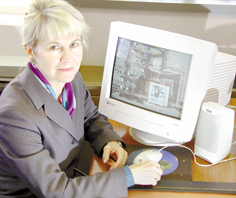|

TECHNOCATION - Elite ranking means elite competition for Maryland tech economy
November 24, 2001
By ELLEN WIGGINS,
Special to the Daily Record

In sports and business, a lot of attention is paid to rankings and polls. College football fans across the country have been surprised by Maryland's unprecedented rise from mediocrity to among the nation's top 10 teams, an ascent masterminded by first-year coach Ralph Friedgen.

Maryland's men's basketball team is working to maintain the standard of excellence established by its best-ever season and first Final Four last year.
Our beloved Baltimore Ravens are fighting every Sunday to defend their NFL crown. For a while, boxing's heavyweight champion of the world was even one of Baltimore's own.
Many sports successes are tracked each week by national polls of experts. Wall Street's army of financial gurus constantly evaluates and ranks stocks based on business fundamentals and potential for growth.
In the same vein, two nonprofit economic think tanks recently gave the Free State high marks in their nationwide ratings of states' chances for success in the new economy.
The Corporation for Enterprise Development ranked Maryland among the nation's best for its economic growth potential. Maryland made CFED's honor roll of the top 10 states nationwide.
CFED recognized Maryland's job quality, entrepreneurial energy, competitiveness, low poverty, and a shrinking income gap between its highest and lowest paid workers.
CFED experts saw a bright future for Maryland based on our state leading the nation in both university and federal research and development. Maryland had the second highest college attainment level nationwide, and entrepreneurs are poised to benefit from our improved access to capital, which improved from a C grade to an A this year.
The Milken Institute ranked Maryland among the top five states that are best positioned to grow in the new economy. We ranked No. 5 in the New Economy Index, below Connecticut, Colorado, California and top-ranked Massachusetts.
Milken graded states based on venture capital investment, R & D dollars, percentage of advanced degrees, business starts, number of patents issued and IPO proceeds.
Milken demographic experts noted that the states that do best are those that convert research capabilities into commercial products and help their economies grow. States and metropolitan areas with clusters of high-tech industries also were predicted to do well.
Our state is doing a better job of building clusters of technology innovation around our excellent universities and research centers. We also have a home court advantage thanks to Washington.
Defense contracts will continue to help drive innovation in biotech, engineering and information technology in Maryland, with collaborative teams of big and small firms continuing to represent the state well.
For example, Maryland-based defense giants Lockheed Martin and Northrop Grumman recently teamed up along with other companies to win the lucrative Joint Strike Fighter contract, which gives the Maryland economy a big boost and will create thousands of jobs.
The JSF project is a boon for the Linthicum-based Electronic Sensors Division of Northrop Grumman, which already makes nearly 60 percent of the Pentagon's airborne radar systems and will develop key parts of the plane's sophisticated targeting and missile detection systems.
The next-generation fighter aircraft, which are scheduled to hit the market in 2008 and stay in production for another 32 years, will mean billions of dollars in business for the Baltimore region and continued employment for more than 500 Marylanders.
Down the B-W Parkway in Fort Meade, the ultra-secretive National Security Agency is granting an increasing number of contracts to small companies.
In August, the NSA turned to the private sector on an unprecedented level by awarding a 10-year, $2 billion contract to Eagle Alliance, a team led by California-based Computer Sciences Corp. that also includes the Northrop Grumman company Logicon.
The Eagle Alliance team will be taking over administrative computer systems and security management of unclassified technology systems, plus secure and non-secure telephones at the NSA's headquarters. The move is expected to save the agency $1 billion over the next decade.
Maryland small businesses also are benefiting from the NSA's historic move toward outside contractors.
Fiber Plus Inc., a computer network installation and service company based in Jessup, was awarded a share of a 10-year, $2 billion NSA contract. Fiber Plus will design and install fiber-optic and copper cables for the famous “puzzle palace” that eavesdrops on vital national security information around the globe.
Incidentally, Fiber Plus also recently installed fiber for the UMBC Technology Center and bwtech@UMBC, the university's research and technology park.
Maryland also seems to be slowly shedding its reputation as economic second-fiddle to Virginia. Virginia ranked 15th to Maryland's 5th on the Milken Institute list.
According to the Mid-Atlantic Venture Association, each of the rival states had 26 companies receiving venture funds in third quarter 2001. But Maryland eked out a slight edge in total funding at $184 million compared to $180 million in Virginia.
While Virginia maintains strengths in IT and dot-com firms, Maryland is developing strong clusters of expertise and success in bioinformatics and photonics. The rate of job growth for both states has been deadlocked for almost the past three years, and no doubt the continued friendly competition will benefit each state in the long run.
From the gridiron to the hardwood to the boardroom, we have a lot to be proud of in Maryland. But we can't get complacent. Our suburban sprawl, crime rate, air quality, health coverage of poor children, and other social and quality of life issues still have a lot of room for improvement.
As the Cleveland Browns, the Arizona Wildcats and Lennox Lewis have made very clear recently, being among the best is no picnic.
Hungry challengers always will get pumped up to take out a top team, no matter if they're wearing cleats, high-tops or wingtips.
Once you've achieved the ranks of the elite in your field, the competition gets really tough, and you have to work even harder to maintain that impressive status.
After all, Virginia also made the CFED honor roll, and business is almost as competitive as ACC basketball these days.
|